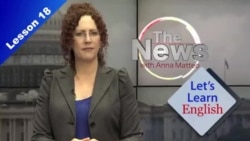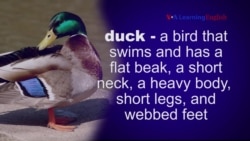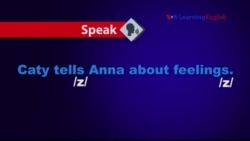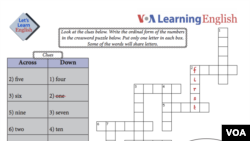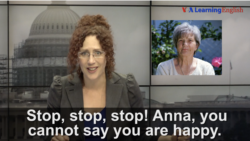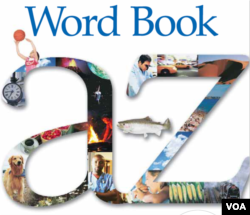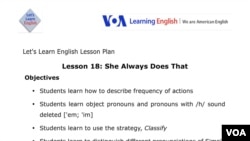Let's Learn English (ມາຮຽນອັງກິດນຳກັນ) ເປັນບົດຮຽນແນວໃໝ່ ສຳລັບຜູ້ຢາກ ຮຽນພາສາອັງກິດ. ພວກນາຍຄູສອນພາສາອັງກິດແບບອາເມຣິກັນ ໄດ້ອອກແບບບົດ ຮຽນນີ້ສຳລັບພວກທີ່ເລີ້ມຕົ້ນໃໝ່. ບົດຮຽນຈະດຳເນີນໄປເລື້ອຍໆເປັນເວລາ 52 ອາທິດ.
ໃນແຕ່ລະອາທິດ ຈະມີບົດຮຽນໃໝ່ ພ້ອມດ້ວຍວີດີໂອ ສະແດງໃຫ້ເຫັນຊີວິດຂອງພວກ ຊາວໜຸ່ມອາເມຣິກັນ. ບົດຮຽນດັ່ງກ່າວ ແມ່ນຮວມທັງຄຳແນະນຳ ໃນການເວົ້າ, ຄຳສັບ ແລະການຂຽນ.
ນອກນັ້ນ ຍັງມີບົດຝຶກຫັດທີ່ພິມໄດ້, ການຊັ່ງຊາ ແລະການວາງແຜນຮຽນສຳລັບສ່ວນບຸກ ຄົນ ແລະນາຍຄູສອນອັງກິດ. ພວກເຮົາຢາກຊຸກຍູ້ໃຫ້ທ່ານຕິດຕາມບົດຮຽນປະຈຳອາທິດ ແລະໂອ້ລົມກ່ຽວກັບຄວາມກ້າວໜ້າຂອງທ່ານກັບພວກເຮົາໂດຍຜ່ານທາງບົດຄວາມເຫັນ ແລະໂດຍທາງອີແມລ.
ໃຈຄວາມ (Summary)
Anna reads the news for the first time. She learns that there is a right way and a wrong way to read the news.
Anna ອ່ານຂ່າວເປັນເທື່ອທຳອິດ. ນາງຮຽນຮູ້ວ່າ ມັນມີວິທີທີ່ຖືກ ແລະວິທີທີ່ຜິດ ໃນການ ອ່ານຂ່າວ.
ເວົ້າ (Speaking)
Learn the new words for this lesson in this video. Also, learn the phrasal verb "got it" to show understanding.
ອອກສຽງ (Pronunciation)
This video teaches about shortened forms of object pronouns that begin with a /th/ or /h/ sound. You also learn about two different ways to pronounce the "s" ending on verbs like "talks" and "says."
ສົນທະນາ (Conversation)
Anna: Hello, from Washington, D.C.! Today at work I am reading the news for the first time. I am really nervous. But my boss, Ms. Weaver, is here to help me.
ຂຽນ (Writing)
In this lesson, Anna is nervous because she is reading the news for the first time. How do you feel when you do something for the first time? Write to us to tell us about yourself or a friend doing something at work or school for the first time. Send us an email or write in the Comments section.
Use the Activity Sheet to practice writing and using ordinal numbers.
ຍຸດທະສາດການຮຽນ (Learning Strategy)
Learning Strategies are the thoughts and actions that help make learning easier or more effective.
The learning strategy for this lesson is Classify. We can classify kinds of words we learn, or groups of things we need to remember.
In the video for this lesson, you see Caty classifying the way she wants Anna to read the news. Caty says, "When we read the news we are always reading facts. We never show our feelings." She is classifying two different things: facts and feelings. Anna needs to learn the difference to read the news the way her boss wants her to do it.
How do you classify when you are learning English? Write to us in the Comments section or send us an email. Teachers, see the Lesson Plan for more details on teaching this strategy.
ສອບ (Quiz)
______________________________________________________________
ຄຳສັບໃໝ່ (New Words)
______________________________________________________________
ອຸບປະກອນການຮຽນຟຣີ (Free Materials)
Download the VOA Learning English Word Book for a dictionary of the words we use on this website.
Each Let's Learn English lesson has an Activity Sheet for extra practice on your own or in the classroom. In this lesson, you can use it to practice writing ordinal numbers.
ສຳລັບນາຍຄູ (For Teachers)
See the Lesson Plan for this lesson for ideas and more teaching resources. Send us an email if you have comments on this course or questions.
Grammar focus: Describing frequency of actions; Object pronouns; ordinal numbers
Topics: Reacting to information; Facts vs. Feelings
Learning Strategy: Classify
Speaking & Pronunciation Focus: Object pronouns with /h/ sound deleted ['em; 'im]
______________________________________________________________
Now it's your turn. Send us an email or write to us in the Comments section below or on our Facebook page to let us know what you think of this lesson.




